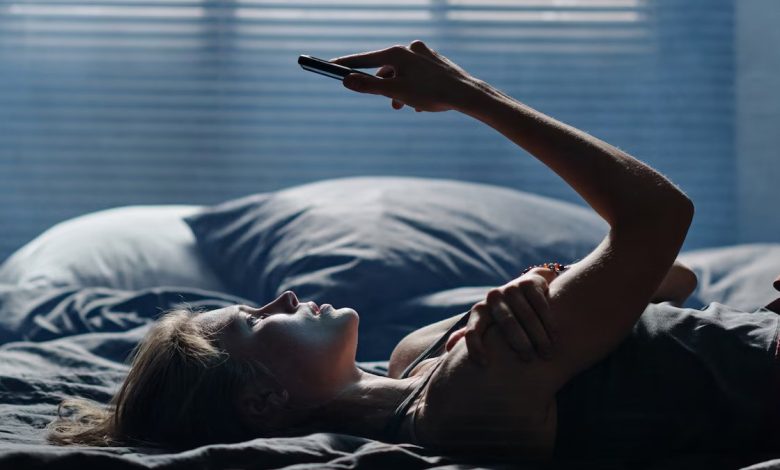New study shows social media use is tied to nightmares
New research shows that social media doesn't only impact mental health during waking hours but may also negatively impact sleep and dream quality as well.

A new study shows that using social media during sleep is associated with worse sleep and more nightmares.
It’s the most recent in a line of research connecting teens’ heavy social media use to concerning mental health consequences, and the first to concentrate on the detrimental psychological effects on dream quality and associated sleep disruptions. Additional unsettling consequences of using social media sites like Facebook, Instagram, X, TikTok, and X are an increased chance of suicide and cyberbullying, as well as an increase in despair and feelings of loneliness and isolation.
Reza Shabahang, the study’s lead author and a research psychologist at Flinders University in Australia, says, “As social media becomes more and more integrated into our lives, its impact may even influence our dreams (as) we found that individuals who spend more time on the platforms during their waking life are more prone to experiencing nightmares.”
According to Shelby Harris, a clinical psychologist and neuroscientist at Albert Einstein College of Medicine in New York City who was not involved in the research, this happens in part because of the content one sees there “about bullying, political fights, distressing news, and social comparisons adds emotional distress, which can lead to bad dreams.”
The results align with prior research on the detrimental effects of social media use on sleep quality and highlight an additional way that social media use can impair general health, even though social media-related nightmares are still considered uncommon. However, the study’s cross-sectional design and self-reported nature render the results non-causal.
How social media impacts dreams
The “social media-related nightmare scale,” which Shabahang’s study team built based on prior nightmare classifications, relevant literature, and other studies that have examined external influences on dream quality, formed the basis for the new research.
Using this scale, 595 research participants reported how frequently they used social media as well as how frequently and intensively they had tech-related nightmares.
Conflicts with other social media users, unsettling news articles, doomsday scrolling, losing access to one’s social media accounts, and sensations of victimisation, powerlessness, and loss of control are a few examples of frequently reported dreams.
Asad Khan, the lead author of a similar study and a biostatistician at The University of Queensland’s School of Health and Rehabilitation Sciences, states that these social media-related nightmares “were associated with increased anxiety, lower peace of mind, poor sleep quality, and nightmare distress.”
Pamela Rutledge, director of the Media Psychology Research Centre in California, who was not involved in the research, adds that “the novelty of this study is that these themes are in the specific context of social media,” even though people may occasionally experience such negative outcomes due to other external factors.
She goes on to say that the “continuity hypothesis of dreaming,” a theory of dreaming that contends that our experiences throughout the day manifest in our dreams, is one of the reasons the study is successful.
According to this model, “people who focus on social media more—especially in an anxious or negative way—would therefore be the people expected to have more nightmares related to social media,” says Deirdre Leigh Barrett, a former president of the International Association for the Study of Dreams and a dream and sleep researcher at Harvard Medical School.
This approach is important because dream quality is probably significantly impacted by how people utilise these platforms. Shabahang points out, for instance, that those who use social media mostly to communicate with friends and family are less likely to have bad dreams than those who use it obsessively to participate in heated online discussions or to follow accounts that frequently share upsetting news.
According to Maida Lynn Chen, a sleep medicine physician and the director of the Paediatric Sleep Disorders Centre at Seattle Children’s Hospital in Washington, social media algorithms are “specifically designed to physiologically and psychologically arouse emotions and feed into media addiction, making the brain and body want even more social media input,” so upsetting information or negative interactions happen frequently on these platforms regardless of the user’s intentions.
How social media affects sleep quality
In addition to unpleasant and upsetting dreams, the Flinders study and other relevant studies indicates that those who use social media excessively also typically have worse sleep quality and sleep interruptions.
“There is evidence from a substantial amount of research that suggests a link between the amount of time spent using screens and poorer sleep quality in children and potentially adults,” says Anthony Levasseur, a sleep researcher at the Centre for Advanced Research in Sleep Medicine in Montreal, Canada.
According to Khan’s 2024 study of over 200,000 social media users, social media habits and behaviours that get in the way of job and school obligations and have a bad effect on interpersonal connections might actually create enough stress to increase the likelihood of having a bad night’s sleep.
According to a different study, teenagers who discover about missed chances or events on social media might get so consumed with FOMO that they stop sleeping.
The graduate program director of Stony Brook University’s Population Health and Clinical Outcomes Research program, Lauren Hale, co-author of a recent related study, states that “any socially- or emotionally-triggering experience can lead to rumination, which could affect both your ability to fall asleep or stay asleep.”
She claims that using social media can also have a practical impact on sleep, as seen by push notifications, vibrations and noises, and other signals that might interfere with or prohibit sleep.
Chen puts it even more simply: “You are not sleeping if your eyes are open and you are doing something else.” Additionally, she claims that intensely captivating material with rapid-fire visuals causes a brain that is “not primed for sleep” to become more alert.
A further concern is “disrupted circadian rhythm due to the blue light emitted from your electronic device,” according to Ben Carter, a medical statistics professor at King’s College London in the United Kingdom. According to Levasseur, this light activates the retina’s blue-light-sensitive ganglion cells, which are photoreceptors in the eye that connect to the gland that produces melatonin. “This ends up suppressing the production of melatonin, which is the hormone that stimulates drowsiness,” he says.
Even while studies reveal that certain individuals are more susceptible to blue light stimulation than others, low melatonin levels have been demonstrated to heighten alertness before bed, making it harder to fall asleep and stay asleep.
Why it matters
All of this has an impact on those who are already probably getting too few Z’s in their sleep.
Twenty percent of adults, according to recent research, sleep for fewer than five hours per night, and over fifty percent sleep for only six or seven hours. To prevent problems associated with sleep deprivation, the U.S. Centres for Disease Control and Prevention advise obtaining seven to eight hours “of good-quality sleep” each night.
Continuous sleep deprivation has been connected to lower immunological function, a higher risk of Alzheimer’s and cardiovascular disease, a lower risk of metabolic health, a higher incidence of obesity and related health problems including diabetes, and poor cognitive function. “Chronic poor sleep is also a precursor and mediator of depression and anxiety,” says Carter.
Hale argues that in addition to talking with their children about appropriate sleep patterns and behaviours, parents should also examine their own social networking activities and screen time before bedtime in order to prevent sleep loss caused by social media use.
She places a strong emphasis on “charging phones in a central location overnight, so you don’t bring your phone with you to bed” and restricting access to really engaging or upsetting information too close to bedtime.




